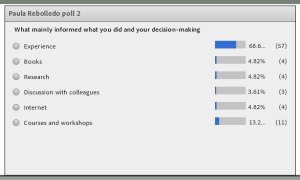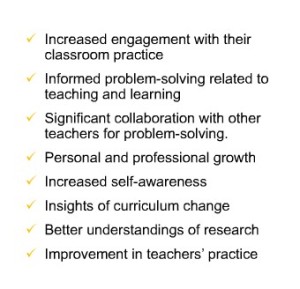I’ve been thinking about the role of research in TEFL recently. This was prompted by Dr Paula Rebolledo’s closing plenary on Day 2 of the Teaching for Success online conference, titled ‘How could research inform EFL practice?’ You can watch it here. The talk reminded me of a few things I’ve read by Penny Ur, including this Guardian article in which she questions whether research is directly relevant to pedagogical issues.
Here’s a summary of points made in Paula’s plenary (I hope she doesn’t mind this blow by blow account but it was a really engaging talk):
- According to her poll, most attendees felt that experience informed their decision making above research (and other resources)
- Research is often inaccessible to teachers (i.e. restricted access journals, costly, etc)
- A lot of research is incomprehensible – it’s full of jargon and there are different discourses used among researchers and academics compared with teachers
- Research findings aren’t always relevant to teachers (mentioned by Ur and others)
- Teachers have different routes to research – engagement WITH research (i.e. reading it) or engagement IN research (doing it). NB: on the latter point – big up our Quircle!
- Some authors (e.g. Ellis, Ur) have suggested that ‘mediators’ may be useful in helping teachers access, understand and facilitate teacher engagement in research
- Huw Jarvis did a bit of self-promo in the chat box saying he was such a mediator. His site looks interesting
- There could be a power imbalance between teachers and researchers. Teachers are seen as being on the receiving end of knowledge. We should rethink this. Perhaps researchers need to better understand teaching, as many may have been out of the classroom for a long time and more used to observing
- Teachers may benefit from undertaking research or working with researchers in many ways, like these:
- The idea of ‘teacher as researcher’ needs to be a ‘bottom up, teacher-led enterprise’
- There are practical issues for teachers engaging in research – lack of time, the need for support from schools and society as a whole, etc.
Key point for me…
Paula rephrased the title of her talk to address a key issue – why would we want research to inform practice? Her answer to this was:
‘…we want is to move from intuition and experience… to evidence. We would like to avoid the ‘anything goes’ approach. What we would want to promote is the sensation that teachers want to make informed decisions, principled decisions. We would hope that teachers do two things – that they theorise in practice, and that they practise their theories…’
My reflections on the talk
Teachers as researchers
I connected with the idea of ‘bottom up, teacher-led’ research. Sarah Smith and I gave a talk at the same conference on teacher-led professional development. Last year we created a kind of action research group at our school. Although there were flaws in how we evaluated the success of this group (fairly loosely if I’m honest!), many teachers gave informal feedback suggesting that they appreciated the chance to get together, share ideas and reflect with others on activities or approaches they’d tried out in class.
Our approach put practice at the forefront, but when we started the group we wanted to try and bridge the gap between research and practice in some way. Our initial idea was for teachers to read research, or more theory-focused literature, and reflect on ways they could make this relevant to their own context – perhaps implementing or trialling new ideas off the back of it.
This was too idealistic for the very reasons Paula mentions. Time restraints being the main one. Reading research (in line with the responses from Paula’s poll) it just not part of the culture at our school. It seems like too much effort for many, and no one will give us hours down to do it so there’s personal investment needed.
Huh?
Many of Paula’s points relate to my current context. In particular, the different discourses used between researchers/academics and teachers. The difficulty with comprehending research sometimes leads me to dismiss it as irrelevant.
I’m currently studying an MA module in materials development. I like the fact that the course is very practical. For example, we might read literature on how to evaluate coursebooks, or methods for introducing grammar, then we have to put what we read into practice through various tasks.
The key reading we cover is mostly accessible and comprehensible, but it’s not hard to find incomprehensible jargon when you delve into the further reading. We covered ‘Principled Eclecticism’ recently – a term I just about understand (I think). One article we read was ‘Toward Principled Eclecticism in Language Teaching: The Two-Dimensional Model and the Centring Principle’ (Mellow, 2002).
In defining the aforementioned term, the author states that ‘the principled combination of [language learning] activities has also been called’…
So researchers have a lot of terms for the same thing! ‘The principled combination of activities’ sounded fine to me. The last term sounds like a good prog rock concept album.
Paula’s right, discourse in academia/research is so different from that in teaching that it’s no wonder people don’t bother with it. What I can’t understand is why researchers don’t want to make their papers more comprehensible to teachers. Do they want to feel authority over teachers? Are they scared of being refuted? Are they not capable of simplifying things? I’ve no idea, but it does seem a bit bizarre at times!
(I think the feeling of inferiority as a teacher rather than researcher has heavily influenced my inner voice. Whenever I read academic research my inner voice sounds really pompous, and like I’m lecturing. I can’t help it. I think there’s less th-fronting in my academic inner voice too.)
Who listens to research anyway?
In addition to Paula’s points about accessibility, relevance and comprehensibility I’d add uncertainty. According to Tomlinson (2013) much research into second language acquisition is inconclusive. He highlights that researchers still disagree on issues like whether there’s a natural order to language acquisition, or whether SLA is primarily implicit or explicit. He goes on to suggest that many published materials include plenty of procedures which are ‘theoretically unsubstantiated’ (e.g. text enhancement, controlled practice, memorisation). I don’t know enough to support this claim to be honest, but it sounds to me like Tomlinson’s hinting that research (or rather the evidence gained from research) isn’t considered that important by course book writers either. I’ll leave that one for Tomlinson to argue I think…!
Who’s this all about anyway?
Paula mentioned some benefits for teachers working with (or as) researchers. She also listed some potential benefits this may have for students.
If research informs and improves practice, it’s ultimately the learners that should benefit. During our talk Silvana Richardson (Bell) asked us how our students benefited from the action research that teachers were undertaking. Most of our ‘evidence’ for this is merely anecdotal – reflections from the teachers based on student feedback, classroom observations, etc. I’d say it was pretty loose.
However, teachers participated in our group in order to improve their own practice – in order to better help their learners. The students were at the heart of what we were doing. Do you think the same could be said for a lot of research? Maybe, I don’t know. I probably would know if I could understand the research better!
Us and them
The talk concluded by stating the conditions needed for teachers to act as researchers: support, balance, flexibility, space, compromise, power. There was also this nice quote, which left me feeling kind of… motivated:
I used to approach researchers and academics all the time with ideas for collaboration, but they never showed any interest. I always took this to mean I wasn’t knowledgeable or skilled enough to help them with their research. Now I feel a bit like it’s the researchers who might be lacking something, especially if they can’t convince teachers that their work is relevant.
(I’m sure there are plenty of researchers who are open to collaboration though. I’ve probably just been unlucky or had rubbish ideas!)
Anyway, rant over! Please share any views you have on any of the above – I’d love to hear other opinions on this topic.
Feature image: copyright Columbia Daily Spectator
Useful reference: Tomlinson, B. [Ed] 2013. Applied Linguistics and Materials Development. London: Bloomsbury
Categories: General, reflections





Interesting post. 🙂 I don’t think it’s always easy for a teacher do be a researcher (and vice versa). However, if a teacher has a research framework to give their research validity then what a great combination of experience and investigation. I imagine that’s where the support comes in! 🙂
LikeLike
Great post. I’ll need to watch that talk.
There’s definitely a very big gap between research and practice. Leo Selivan wrote a really good post about it entitled Misapplied linguistics. Well worth reading.
LikeLike
My hope is that one day all teacher education programmes will have a compulsory unit of research in them. And by research I mean projects the provide the skills to collect and analyse data and inspire teachers to observe and measure.
LikeLiked by 1 person